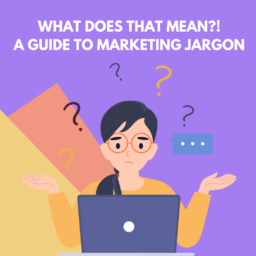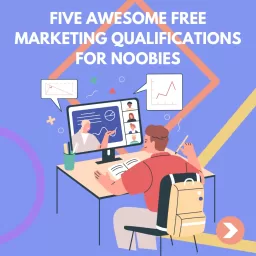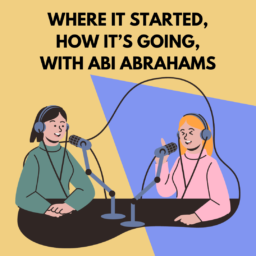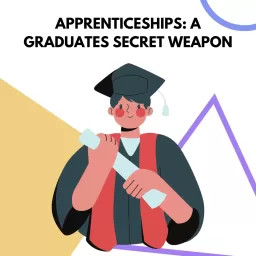Laying down my cards
Okay, so, from the outset, here are my cards. I’m really not a fan of degrees, well, 90% of them anyway. So, this article will be quite biased. However, I myself have a degree, so I have some flesh in the game. Additionally, like 99% of post-graduates, I was lumbered with debt for the privilege of owning a piece of paper that declared that I’d been able to study continuously towards a singular subject which inevitably had little to no bearing on my career trajectory.
Animation -> Marketing -> Coaching -> Running an apprenticeship provider… Go figure.
Now, I also see the other side of the argument, that some degrees are vital to career progression or niche fields. STEM subjects, for example, have far more weight than creative degrees. Again, I’m sorry to offend you if you have one of those types of degrees. But again, so do I.
Anyway, could I rewind the clock, I would have genuinely taken a completely different educational path and ultimately saved myself quite a lot of cash.
In this article, I want to explore some of the alternative routes that someone could use instead of going to university. My aim is to help you save at least £40,000 whilst achieving a similar result to studying towards a degree. Feel free to call me a moron on social media if you think this is an exercise in futility…
As a heads up, this isn’t a sequential list and should only be used as an idea or reference of some of the dozens of activities one could take in order to develop their skills and knowledge in marketing in order to land their first role in the field. So, here we go.
Read the following books over 6-12 months
You may not enjoy reading, and if that’s the case, good luck conducting research as a marketer during the strategy and planning stages of campaigns. Not all information is available in 30-second Tiktok sound-bites you know… I’m only joking, not everyone enjoys learning through reading. I get that. However, there are some great books on marketing out there.
Here are several books that I’d recommend any soon-to-be marketer read over the next 6 to 12 months.
- Influence: The Psychology of Persuasion by Robert Cialdini: This book explores the psychology behind why people say “yes” and how to apply these principles in marketing;
- Contagious: How to Build Word of Mouth in the Digital Age by Jonah Berger: Berger delves into the science behind why things catch on, providing insights into creating viral marketing campaigns;
- Made to Stick: Why Some Ideas Survive and Others Die by Chip Heath and Dan Heath: Learn about the key principles that make ideas memorable and how to apply them to marketing campaigns;
- Building a StoryBrand: Clarify Your Message So Customers Will Listen by Donald Miller: This book provides a framework for crafting a compelling brand story that resonates with your target audience;
- Jab, Jab, Jab, Right Hook: How to Tell Your Story in a Noisy Social World by Gary Vaynerchuk: Vaynerchuk offers practical advice on creating engaging content and leveraging social media platforms effectively;
- Digital Marketing for Dummies by Ryan Deiss and Russ Henneberry: A comprehensive guide to digital marketing strategies for beginners, covering topics like SEO, content marketing, email marketing, and more;
- Purple Cow: Transform Your Business by Being Remarkable by Seth Godin: A personal favourite of mine. Godin advocates for creating remarkable products and marketing strategies that stand out in a crowded marketplace;
- Marketing 4.0: Moving from Traditional to Digital by Philip Kotler, Hermawan Kartajaya, and Iwan Setiawan: Explore the shift from traditional to digital marketing and how to adapt your strategies to thrive in the digital age.
Doing is a powerful thing
Knowledge will only take you so far. So it’s really important that as you prepare yourself to start applying for your first marketing role you ultimately have something other than a CV to show that you’re worth hiring. I recently wrote an article on why you should start a portfolio and de-prioritise your CV when trying to land your first marketing role. You can read that here.
Anyway, here are some activities you can proactively work towards:
- Start a blog or podcast: Apply what you’ve learned by creating your own content. Experiment with different content formats and distribution channels to reach your target audience;
- Work on real-life marketing projects: Offer your marketing services for free, yes, free, to local businesses or non-profit organisations. This hands-on experience will allow you to apply theoretical knowledge to real-world scenarios;
- Attend marketing workshops and webinars: Keep up-to-date with the latest trends and best practices in marketing by attending workshops, webinars, and industry events. Many of these resources are available online for free or at a low cost;
- Network with industry professionals: Join marketing communities on platforms like LinkedIn or attend local networking events to connect with professionals in the field. Building relationships with industry insiders can provide valuable insights and opportunities;
- Take online courses and certifications: Platforms like Coursera, Udemy, and HubSpot Academy offer a wide range of online courses and certifications in marketing-related topics. These courses are often taught by industry experts and provide practical, actionable knowledge;
- Experiment with different marketing tools and software: Familiarise yourself with popular marketing tools and software platforms such as Google Analytics, Mailchimp, Hootsuite, and Canva. Hands-on experience with these tools will enhance your skillset and make you more marketable to employers.
Basically, what I’m getting at here is you can’t just sit there and expect employers to offer you jobs based on an A4 document that says you want to be a marketer. Unfortunately, though degrees have become a bit of a commodity, without one, you’re already second best. So, to balance out the scales you’ll have to bust your arse to show that you’re worth hiring. I didn’t say it’d be easy. But, you’ll be around £40k less in debt so swings and roundabouts.
Courses and work experience
- Apprenticeships: I run an apprenticeship provider. I’m obviously going to recommend them. Duh. But, explore marketing apprenticeship programmes offered by companies in various industries. Apprenticeships provide a combination of on-the-job training and classroom learning, allowing you to gain practical experience while earning a salary. PS, you can study towards degree apprenticeships…;
- Internships and work placements: Seek out internships or work placements with marketing agencies, companies, or non-profit organisations. These opportunities offer valuable hands-on experience and the chance to network with industry professionals. If you can’t find any going, just approach agencies and ask if they’d be willing to let you do some shadowing to get some experience;
- Professional qualifications: Consider pursuing professional qualifications offered by organisations such as the Chartered Institute of Marketing (CIM). These qualifications are highly respected in the industry and can enhance your credibility as a marketing professional. They range in price, level, and duration, and look great on your CV;
- Freelancing and consulting: Consider freelancing or starting your own marketing consultancy business once you’ve gotten some practice. Freelancing allows you to work with a variety of clients and projects, gaining valuable experience and building a diverse portfolio. This doesn’t need to “take off” but can supplement your income and make working at Starbucks a little more bearable;
- Mentorship: Find a mentor who can provide guidance and support as you navigate your career in marketing. A mentor can offer valuable advice, share industry insights, and help you overcome challenges along the way.
Now, you’ve got to…
If you’re not going to take the uni bullet, you will want to get a couple of ducks in a row so that you can work towards some of the above. Think about your personal circumstances and be critical about what you need to do. Consider things like:
- Get a job to hold you over financially: Not only will it fund your ability to survive, but it’ll show that you’re able to hold down a job and that you have the drive to study and develop skills in your own time. Remember, you want to show work ethic, drive, and the willingness to learn;
- Invest money into yourself: Free courses will only take you so far. Ultimately, there’s a reason they’re free. So, investing money into your professional development will pay dividends. Seriously consider taking entry-level courses and certifications with awarding organisations and industry-specific bodies. CIM and MRS are two that we work with specifically. They may cost a chunk of change, but the end result will look great on that CV of yours;
- Be willing to sacrifice some spare time: Self-driven study and development will take place in your spare time. This means that you’ll have to do it once you’ve finished those gruelling shifts at work. But, nothing good came easy, and, sacrificing those couple of hours a week will feel a hell of a lot easier than losing that £400+ per pay packet each month;
- Be persistent: Make decisions quickly and change them slowly. Give things a bit of time. When things get tough on this course, do not give up and change direction immediately. Pivoting is a big part of life, but, if you pivot every other month, you’ll get nowhere with lots of little things. If uni isn’t for you, then stay the course and focus on the goal of becoming an awesome marketer within 1 – 3 years.
Right, off you go
We created a little challenge back in Dec 23. A 6-month plan that was designed for those looking to break into marketing taking you from zero to thirty. You can find it here if you’re interested. However, if you’d prefer a slower and more gradual journey. Take what I’ve written here and start planning your approach. Get yourself a calendar and start plotting out study times and milestones. Do some Google research and look into training courses, books, blogs, and YouTube videos and set yourself some goals.
What’s really important with all of this is to make them specific, measurable, achievable, timely, and relevant… or, as you’ve likely heard before, SMART. Personally, I used to hate this sort of stuff, but, after actually embracing models like SMART goals, I realised that they can actually be what you need to ensure you keep working towards something.
Anyway, off you go. Get started, stick to it, and in 6 – 12 months you WILL have landed your first role in marketing without having £40k of debt hanging over your head. Good luck!
Interested in seeing more of our guides, advice, and articles on marketing apprenticeships?
Then sign up for our monthly newsletter. We’ll send you all the information on our latest stuff and general updates as well. Sign up below!

















